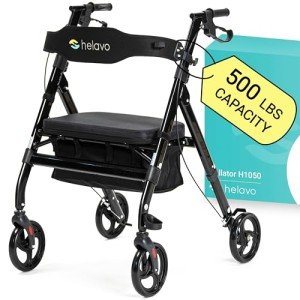This company has no active jobs
What's The Current Job Market For Four Wheel Walker Professionals Like?

Understanding the Four-Wheel Walker: A Comprehensive Guide
As people age or face health obstacles, mobility can end up being a significant concern. The four-wheel Bariatric Walker-- also referred to as a rollator-- is designed to assist those who require support while walking. This guide will explore the advantages, features, and types of four-wheel walkers, providing crucial details for individuals, caretakers, and health care specialists.

What is a Four-Wheel Walker?
A four-wheel walker is a mobility aid that features four wheels, hand brakes, a seat, and typically a storage compartment. Unlike conventional walkers that need users to lift them with each action, four Wheel Walker-wheel walkers enable smooth movement and offer additional support for people who might fight with balance or endurance while walking.
Key Features of a Four-Wheel Walker
| Feature | Description |
|---|---|
| Wheels | Typically features four wheels for improved mobility. |
| Brakes | Hand-operated brakes for included control and security. |
| Seat | An integrated seat permits users to rest when required. |
| Storage | Frequently consists of a storage pouch or basket for individual products. |
| Height Adjustability | Can be changed to fit the user's height for comfort and ease of use. |
Benefits of Using a Four-Wheel Walker
1. Improved Mobility
One of the main advantages of a four-wheel walker is the increased mobility it provides. Users can browse through indoor and outdoor areas quickly, thanks to the rolling wheels. This mobility encourages exercise, which is essential for keeping overall health.
2. Security and Stability
Four-wheel walkers come geared up with sturdy frames and reliable braking systems. This design promotes security, particularly for people with balance issues, guaranteeing they feel secure while walking.
3. Convenience Features
With the addition of a seat and ergonomic manages, four-wheel walkers provide comfort during use. Users can take breaks whenever needed, which is especially helpful for those who tire quickly.
4. Adaptability
These walkers can be utilized in different settings, consisting of in the house, in public areas, and outdoors. Lots of models are developed to be lightweight and foldable, making them easy to transport.
Kinds Of Four-Wheel Walkers
Not all four-wheel walkers are created equivalent, and a number of variations accommodate particular needs and preferences. Below is a list of various kinds of four-wheel walkers:
1. Standard Rollators
Requirement rollators are the most typical type, including standard designs with four wheels, hand brakes, and a seat. They are appropriate for everyday use, providing important support for walking.
2. Heavy-Duty Rollators
These walkers are designed for users with higher weight-bearing needs. Heavy-duty rollators have actually strengthened frames and broader seats, accommodating larger individuals while providing the exact same mobility and support.
3. Lightweight Rollators
Suitable for those who travel regularly, lightweight rollators are compact and easily foldable. They are hassle-free for transport and are typically simpler for users to maneuver.
4. Rollators with Specialized Features
Some rollators include unique features, such as integrated LED lights for night usage, baskets created for carrying larger items, or boosted suspension systems for enhanced convenience on uneven surface areas.
How to Choose the Right Four-Wheel Walker
Picking the ideal four-wheel walker requires factor to consider of numerous aspects. Here's a checklist to guide you:
1. User's Weight and Height
- Make sure the Top-Rated Walker can support the user's weight.
- Pick an adjustable design that accommodates the user's height for comfortable use.
2. Planned Use
- Consider where the walker will primarily be used: indoors, outdoors, or both.
- Search for models with larger wheels for better performance on outdoor terrains.
3. Convenience Features
- Assess the seat height and comfort level.
- Inspect for additional features, such as padded handles, for enhanced use.
4. Storage Needs
- Figure out if the user needs a storage pouch or basket for carrying individual belongings.
5. Spending plan
- Assess the costs, bearing in mind that costs can range widely depending on the features and brand name.
Frequently Asked Questions (FAQ)
Q1: Are four-wheel walkers ideal for any ages?
A: While the majority of frequently used by older adults, four-wheel walkers can benefit people of any ages who have mobility difficulties due to injury, surgical treatment, or health conditions.
Q2: How do you maintain a four-wheel walker?
A: Regularly examine the wheels for particles, ensure the brakes function properly, and periodically clean the Best-Selling Walker with moderate soap and water to keep it in great working order.
Q3: Can I use a four-wheel walker outdoors?
A: Yes, many four-wheel walkers are created for both indoor and outdoor usage. Nevertheless, choosing a model with bigger, durable wheels is recommended for uneven surface areas.
Q4: Do insurance coverage strategies cover the cost of four-wheel walkers?
A: Coverage differs by insurance coverage strategy. It's best to consult with your service provider relating to coverage for mobility aids.
Q5: How do I find out to utilize a four-wheel walker appropriately?
A: It may be beneficial to deal with a physiotherapist or health care professional to find out how to utilize a four-wheel walker securely and effectively.
Four-wheel walkers act as valuable mobility help for those who require additional support while walking. By comprehending their features, benefits, and types, users and caretakers can choose the best model to boost mobility and maintain self-reliance. As mobility obstacles arise, it's soothing to know that tools like four-wheel walkers can considerably improve quality of life and promote a more active lifestyle.
- Endereço INDIA
